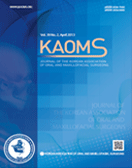Journal of the Korean Association of Oral and Maxillofacial Surgeons
- P-ISSN2234-7550
- E-ISSN2234-5930
- SCOPUS, KCI, ESCI
 ISSN : 2234-7550
ISSN : 2234-7550
혈관내피세포성장인자 억제제에 의한 구강편평상피세포암종 세포주의 성장 억제 효과
ANTI-TUMOR EFFECTS OF VASCULAR ENDOTHELIAL GROWTH FACTOR INHIBITOR ON ORAL SQUAMOUS CELL CARCINOMA CELL LINES
이재훈 (단국대학교)
Abstract
Tumor angiogenesis is a process leading to formation of blood vessels within tumors and is crucial for maintaining a supply of oxygen and nutrients to support tumor growth and metastasis. Vascular endothelial growth factor( VEGF) plays a key role in tumor angiogenesis including induction of endothelial cell proliferation, migration, survival and capillary tube formation. VEGF binds to two distinct receptors on endothelial cells. VEGFR-2 is considered to be the dominant signaling receptor for endothelial cell permeability, proliferation, and differentiation. Bevacizumab(Avastin, Genetech, USA) is a monoclonal antibody against vascular endothelial growth factor. It is used in the treatment of cancer, where it inhibits tumor growth by blocking the formation of new blood vessels. The goal of this study is to identify the anti-tumor effect of Bevacizumab(Avastin) for oral squamous cell carcinoma cell lines. Human squamous cell carcinoma cell line(HN4) was used in this study. We examined the sensitivity of HN4 cell line to Bevacizumab(Avastin) by using in vitro proliferation assays. The results were as follows. 1. In the result of MTT assay according to concentration of Bevacizumab(Avastin), antiproliferative effect for oral squamous cell carcinoma cell lines was observed. 2. The growth curve of cell line showed the gradual growth inhibition of oral squamous cell carcinoma cell lines after exposure of Bevacizumab(Avastin). 3. In the apoptotic index, groups inoculated Bevacizumab(Avastin) were higher than control groups. 4. In condition of serum starvation, VEGFR-2 did not show any detectable autophosphorylation, whereas the addition of VEGF activated the receptor. Suppression of phosphorylated VEGFR-2 and phosphorylated MAPK was observed following treatment with Bevacizumab(Avastin) in a dose-dependent manner. 5. In TEM view, dispersed nuclear membrane, scattered many cytoplasmic vacuoles and localized chromosomal margination after Bevacizumab(Avastin) treatment were observed. These findings suggest that Bevacizumab(Avastin) has the potential to inhibit MAPK pathway in proliferation of oral squamous cell carcinoma cell lines via inhibition of VEGF-dependent tumor growth.
- keywords
- Tumor angiogenesis, Vascular endothelial growth factor, Bevacizumab(Avastin)
- 다운로드 수
- 조회수
- 0KCI 피인용수
- 0WOS 피인용수